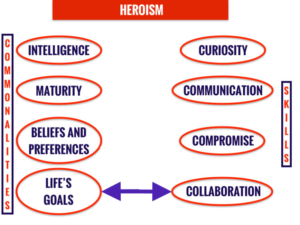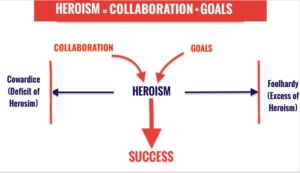Heroism is defined in the dictionary as "bravery, courage, valor, intrepidity, boldness, daring, audacity, fearlessness." It is a character trait and virtue that you want, when you see yourself desiring to help or even save a partner. Heroism is a combination of the Skill of Collaboration with the trait (or Commonality) of success at goals.

This means that mature, advanced collaboration as a set of skills does not just amount to "putting our heads together." (That's part of compromise.) Instead, it is a mature effort to dive into one's personal dreams with action and "co-labor," as the root of the word collaboration implies. It can be aligned into a common goal, and what other aspects of them might at least be avoided in terms of interference from the other partner's dreams.
What makes Heroism unique as a character virtue, is that it addresses the focus on winning at a goal, yet with some degree of the hero not quite getting exactly what they want, personally. They may even make a sacrifice in order to each the joint goals, even while their partner may not be as sacrificing, or even as synthetic in approach.
The Hero captures opportunity that is unexpected and is prepared to act suddenly in response to sudden threats and obstacles to the goals, with committed and decisive action, sometimes over the protest of the partner who is less Heroic, Competent, or Resilient (not to mention Equanimitous.)
We may clearly see examples of how personality style may also align with the higher-brained notion of a mature character virtue, here. For example, if one were a Magician Personality, high on confidence at some areas of life, it can be very reassuring to a person who has a great deal of uncertainty and the need for a partner with a healthy dose of Heroism, which might bring them more satisfaction in the relationship, when done right. Kings and Queens will take naturally to a Magician who has such character virtues that are outgoing and confident in this way. You might see Heroism as a character virtue may work hand in hand, naturally, with having more of a big-picture, can-do attitude that Magicians (and somethings Warriors) are known to have.
At the reptilian level, we might also see a male with the prominent character virtue of Heroism having a seemingly unlimited supply of "take charge" utility and helpfulness to those that she or he love, however, there might be much more of a tendency toward self-sacrifice for the purpose rather than just shooting for goals as the "do or die" task. This speaks to the sexual attraction between them in Step 2 of courtship, "Ladies and Gentlemen," where the man "lets the woman know he likes her" through doing such "fatherly" things as assisting her on some tasks, or taking over responsibility for some of their duties the way a kind father to a daughter might. The know-how and action that is built into Heroism as a character virtue. It amplifies a partner's reptilian-brained femininity or masculinity.

The vice of deficit for Heroism is called, "Cowardice," which is in essence, surrender of one's own personal goals and dreams on the altar of FEAR, facilitated by the less balanced, more fearful Lover or King/Queen personalities. When it comes to life's goals and your dreams, it doesn't make for a good teammate to have Cowardice in a partner, nor to have Foolhardiness from a partner, and so the one experiencing the vice of Cowardice self-sabotages in a way that also sabotages the relationship, while being foolhardy as a partner, also directly causes joint goals to fail, such as in someone with ADD, or lacking Observing Ego to carefully weight and measure a joint strategy at goals. Cowardice toward a potential partner is similar to the common phrase that partners say: "He chickened out." Or "She bailed on me," or in the case of Foolhardiness, my boyfriend/girlfriend/spouse "ran us off a cliff."
These features show the vice in some relationships that pertain to the deep nature of how commitment and partnership really are a team approach, and even of the many ways that modern couples tend to ignore or violate their own marriage vows - "to cherish," rather than take for granted, and "to have and to hold," rather than to boss around.
We might often see a couple have a falling out, because they can see, hear and feel the deep level of thoughtlessness in Cowardice and Foolhardiness as vices, when instead, we needed their Heroism as a virtue - something that can only come from a mature, constructive place, characterized by a "win/win" attitude and actions in the partnership.
Heroism has bearing on our performance in phase three - intellectual attraction - step eight, where we seek to amplify the best virtues toward our goals. It is what causes us to see our mate as "a hero" in our lives, and us to feel safe in being with them.

